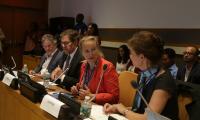Human rights are key to sustainable development

Last week, the Danish Institute for Human Rights summoned numerous key actors at the High-level Political Forum on sustainable development to discuss the role of human rights in the 2030 Agenda. At the annual forum, the international community comes together at the UN headquarters in New York to review the process towards 2030 and the implementation of the Sustainable Development Goals.
The institute organised the event with partners from government, UN agencies, indigenous peoples, business and civil society.
Partnerships are vital to the 2030 Agenda
In her opening remarks, the international director at the Danish Institute of Human Rights Eva Grambye emphasised the need for partnerships to unleash the transformative potential of the 2030 Agenda. This was seconded by Danish Ambassador Ib Petersen, underlining the role of states in the implementation and the potential of using the 2030 Agenda to uphold human rights achievements, including women’s rights.
Craigh Mokhiber of the Office of the High Commissioner noted that this is the first time we have an effective interface between the human rights and the development agendas, which pays attention to inequality and discrimination.
“If states focus on just a few goals, without addressing inequality, the agenda falls apart,” he argued.
Human rights provide a solution to weak accountability
The weak accountability mechanisms of the 2030 agenda were raised by several speakers, and Alan Miller from the Global Alliance of National Human Rights Institutions explained how national human rights institutions can help counter the shrinking space for civil society, including by working for the implementation of the SDGs.
Alvaro Pop from the Indigenous Peoples Major Group noted that the achievement of the SDGs will require dialogue and profound state reform, to understand and encompass the multicultural nature of societies, in respect of indigenous peoples’ world views and rights.
This was echoed by other indigenous speakers who emphasised the importance of land rights as well as the threats faced by indigenous land rights defenders.
Businesses play an important role
Lise Kingo, executive director of the UN Global Compact, explained how companies can use the 2030 Agenda as a lighthouse, to set priorities for their core business.
“Already, 87% of CEOs from the UN Global Compact membership indicate that they see the SDGs as strategically important for their business development the coming years,” she said.
Communications manager at Nestlé Emily Dimiero explained how Nestlé has undertaken a human rights impact assessment, and developed a roadmap to address its salient human rights issues across its diverse geography and complex supply chains.
“Nestle has related its salient issues to the SDGs, and will start reporting on these on 2018,” she promised.
The dialogue will continue
As the discussion evolved, key speakers from UN agencies, indigenous peoples, civil society, the academic word and national human rights provided further insight into their initiatives, approaches and tools to realise both human rights and the sustainable development goals. The Danish Institute for Human Rights will prepare a highlight report from the event, and in general seek opportunities to continue this much needed dialogue.
You can watch the full event in three separate videos on the Facebook pages of Indigenous Peoples Major Group and Roberto Borrero.
Materials presented by the institute at the session are available on this page.
